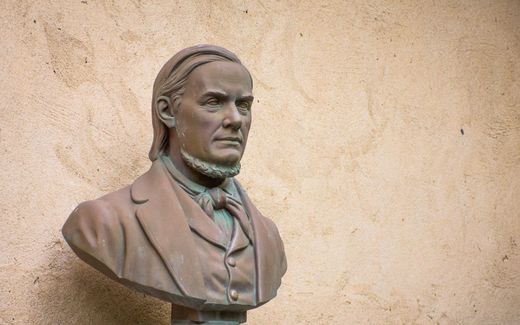Seven values of success that Germany owes to the Bible

Mercedes-Benz is one of the remarkable branches of the German industry. Photo AFP, Thomas Kienzle
Central Europe
Many have tried to explain why Germany is one of the most prosperous nations in the world. Hans-Joachim Hahn has a very different explanation than most other researchers. Hahn sees seven values behind German prosperity, all of which spring from the Bible.
Could you describe the seven values that have shaped Germany’s economic success? “The first value is the Protestant work ethic. German people have a reputation for working hard and diligently. This is contrary to Ancient Greece or China, where workers were looked upon as second-class citizens. In Germany, work is seen as making a man noble.
The second value is integrity, a commitment to truthfulness.
Thirdly, there is trust, which springs from integrity.
Fourthly, there is respect, which allows people to be seen as unique creatures with unique gifts rather than mere productive capital.
Fifthly, the value of responsibility is the understanding that man is responsible before God and other men.
The sixth value is sustainability.
And last but not least, there is the courage to admit mistakes. At the same time, this is unique to Christian cultures. In Asian cultures, for example, admitting mistakes kills your respect in the eyes of others.”
You talked about sustainability. Usually, environmentalists talk about that, but they are not often favourable toward Christianity. So, how do you claim that it springs from the Bible?
“Sustainability is quite a popular idea nowadays. Environmentalists suggest that they have created this value. It was already expressed in Genesis 1 when God mandated man to care for His creation.”
So, why do you believe that it was the Bible that brought these seven values to Germany?

“Everyone agrees that Martin Luther made Germany a learned nation. He was the first to demand universal education for boys and girls. Children had to learn Luther’s catechism, which contained the Ten Commandments. All these seven values spring from them.
Moreover, Christian education was not born with Luther. The monasteries had already founded the oldest German universities a few centuries earlier. This means that we owe the education system that has allowed these seven values to shape public life to the Bible. Thanks to generations of men and women who taught these values, Germany became the prosperous nation we know.”
How about the influence of the Enlightenment, then? “Some people attribute these values to the Enlightenment. But even this philosophical movement began with biblical scholars. The problem, however, is that the heart of the Enlightenment is faith in man’s reason: rationalism. However, such a faith doesn’t nurture these values because man’s reason is not a reliable foundation for building values.
One of our most famous philosophers, Friedrich Nietzsche, showed that values are purely arbitrary if they are based on human reason. This is why they are fading away today.”
You have given lectures about this for years. How is your teaching received?
“Most of the time, people are surprised. They tell me: “I never saw it like that, but how you explain it is logical and clear.”
I remember a Roman Catholic entrepreneur who came to me after such a teaching and said: “You have just explained to me why my business is successful.”
I believe that people are astonished because, instead of talking about external symptoms, such as the rate of unemployment or GDP per capita, I reveal the core motives.”
Any negative feedback?
“That usually comes when I have spoken to audiences ideologically committed to communism, socialism or environmentalism. The more ideologically committed people were, the less willingness they showed to debate.
This is understandable because my approach leads to a form of society which promotes freedom and personal responsibility. It starkly contrasts with the ideal of a strong socialistic state system, which their ideologies promote.
But in general, my teaching is well received whenever my audience is not so firmly committed to any ideology, whether they are Christians or not.”
Do you believe that these seven values can again shape Germany’s future?
“At present, the circumstances are not favourable. In politics, even Christian Democrats are deeply committed to ideologies such as socialism or environmentalism. This creates a powerful state, which diminishes people’s freedom and value, makes them subordinate rather than mature citizens, and thus impoverishes them, for example, by raising taxes.
As a believer in God and the Bible, I know that change is possible. In the book of Jonah, God did not destroy Nineveh when the citizens decided to repent. We need such a radical change that will re-emphasise those biblical success values at the foundation of the German social market economy, which balanced social responsibility and personal freedom. It might take decades and a profound downfall. Still, a return is always possible because it is biblical, and history proves it.”
Who is Hans-Joachim Hahn?
Hans-Joachim Hahn (born 1950) is a lecturer on ethics in economics and society. Trained as a grammar school teacher in English and physical education, Hahn experienced a dramatic change of career when he sensed God’s calling to inspire universities to adopt a positive attitude toward the Christian worldview again.

For several decades, he has worked with Campus für Christus, (Agape Europe), an organisation that seeks to reach university students with the Gospel.
After twenty years, he founded Professoren Forum (professors’ forum), a network that aims to gather Christian professors and scholars to work on the Christian worldview. The forum helped organise debates between people holding various worldviews in a climate of mutual receptiveness.
Hahn developed his teachings on German success values through his mentor, Prof. Johann Millendorfer from the University of Vienna, who pioneered computer-based analyses.
Today, Hahn works with Truth and Transformation, an organisation aiming to build a new educational system based on the biblical worldview.
Related Articles










